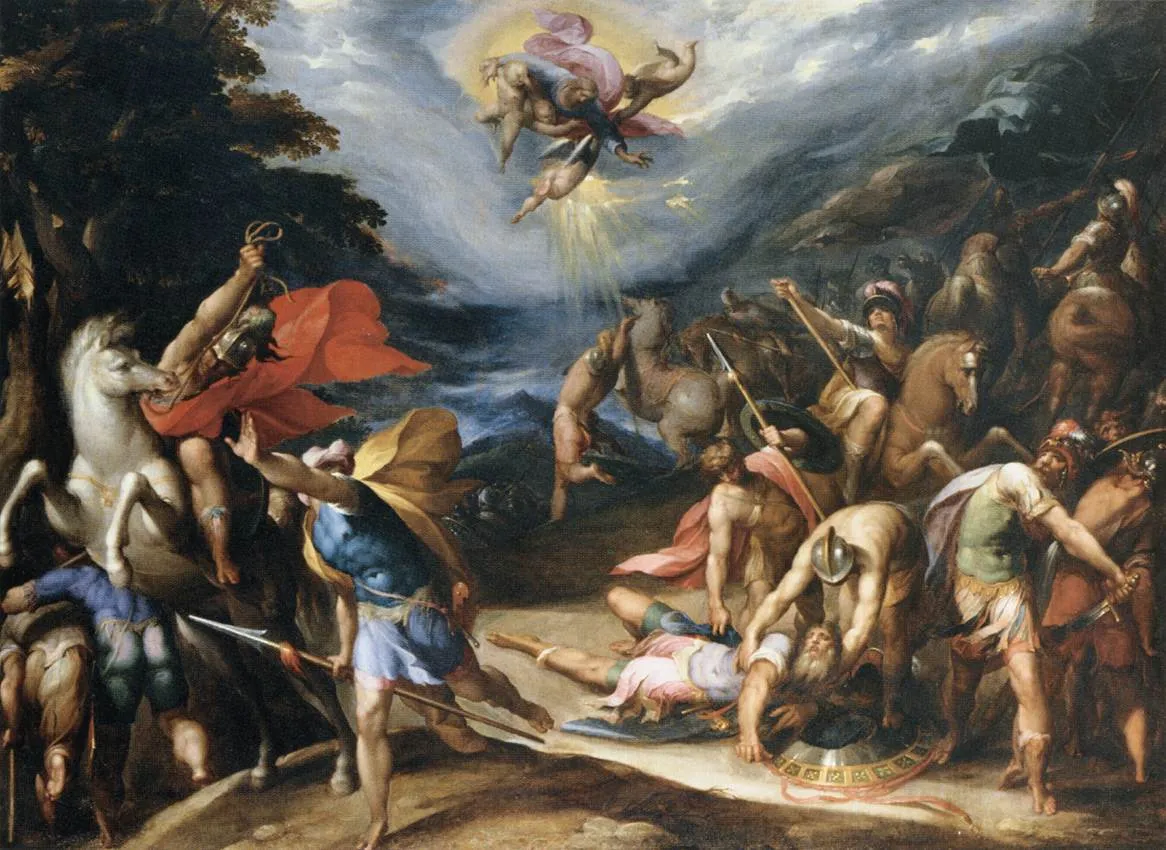The story of the apostle Paul is one of the most fascinating in all of Christian history, with his conversion experience serving as a cornerstone of the religion. However, what exactly happened on the road to Damascus that would change Saul of Tarsus into the apostle Paul? In this article, we will delve deep into this pivotal moment in biblical history and examine how it shaped the life of one of the most important figures in the early Christian church. Keep reading to learn more about this transformative religious experience.
The Early Life of Saul of Tarsus
Before delving into what happened on the road to Damascus, it’s important to understand who Saul of Tarsus was before his conversion to Christianity and how that played a role in his eventual transformation into the apostle Paul.

Saul was born in Tarsus, a city in modern-day Turkey, and was a devout Jewish Pharisee. He was highly educated, having studied under the respected teacher Gamaliel, and was zealous in his defense of Judaism. In fact, before his conversion, Saul was known for persecuting Christians, hunting them down and imprisoning them.
As a young man, Saul likely never imagined he would one day become a key figure in the Christian faith. But, as we’ll explore in the next section, something extraordinary happened to him on the road to Damascus that changed the course of his life forever.

Understanding Saul’s background is important because it shows that while he had a dramatic conversion experience, his unwavering dedication to his beliefs was a key part of his character from the beginning. This trait carried over into his new life as Paul and helped to shape his unwavering commitment to spreading the gospel and building the early Christian church.
Some key facts to know about Saul before his conversion:
- He was a Pharisee, part of a strict Jewish sect known for their adherence to the law.
- Saul was a tentmaker by trade.
- He was initially known for persecuting Christians and played a role in the stoning of Stephen, one of the early Christian leaders.
- Despite his initial opposition to Christianity, Saul became one of the most influential figures of the early church and wrote many of the letters in the New Testament.
In the next section, we’ll dive into what happened on the road to Damascus and explore how Saul’s encounter with Jesus led to his conversion and eventual transformation into the apostle Paul. But first, take a moment to reflect on the significance of Saul’s background and how it might have influenced his spiritual journey.
Key takeaways:
- Saul was a devout Jewish Pharisee before his conversion.
- He was initially known for persecuting Christians and played a role in the stoning of Stephen.
- Saul’s unwavering dedication to his beliefs carried over into his new life as Paul and helped shape his commitment to spreading the gospel.
The Road to Damascus: A Spiritual Awakening
Saul of Tarsus, also known as Paul, had a transformative experience on the Road to Damascus that would change the course of his life and greatly impact Christian history. According to the book of Acts in the New Testament, Saul was a zealous persecutor of Christians before the event that occurred on the Damascus Road.
While on his way to Damascus, he experienced a blinding light and heard a voice from heaven asking, “Saul, Saul, why do you persecute me?” Saul replied by asking who was speaking to him, and the voice replied, “I am Jesus, whom you are persecuting.” This divine encounter left Saul blinded and humbled. It was this event that led to his conversion and eventual transformation into one of the most influential figures in Christian history.
The Damascus Road experience is a pivotal moment not only in Paul’s life but also in the history of Christianity. The encounter with Jesus on that road brought about a spiritual awakening in Saul. It is through this experience that Saul became Paul, the apostle to the gentiles.
This event has inspired many Christians on their own spiritual journeys. It serves as a reminder of the transformative power of God and the potential for redemption in anyone’s life. The Road to Damascus is a metaphor for the religious journey that each person undergoes in their own way. It symbolizes the challenges and triumphs of spiritual growth and transformation.
The historical significance of the Road to Damascus event cannot be overstated. It is a key moment in the history of the early church and the spread of Christianity. It is through Paul’s teachings and writings that the Christian faith became accessible to people beyond the Jewish community. Paul’s travels and missionary work led to the establishment of many Christian communities throughout the Mediterranean world.

The story of the Road to Damascus is an essential part of the biblical narrative. It highlights Saul’s conversion, which was not only a turning point in his own life but also in the history of the Christian faith. Through this event, Saul became an instrument of God’s grace and mercy, bringing the message of salvation to countless people.
In conclusion, the Road to Damascus event is a powerful reminder of the transformative power of God in our lives. Saul’s story highlights the potential for spiritual growth and redemption in anyone’s life, regardless of their past mistakes or failures. It is through this event that Paul became one of the most influential figures in Christian history, leaving a lasting legacy that continues to impact the world today.
The Immediate Aftermath of the Damascus Encounter
After Saul’s encounter on the road to Damascus, he was left physically blind and emotionally confused. He was led to Damascus, where he fasted and prayed for three days. During this time, Saul had a vision of a man named Ananias who would come and heal him.
On the third day, Ananias arrived and through prayer, Saul’s sight was restored. Ananias also baptized Saul and he was filled with the Holy Spirit. The immediate aftermath of Saul’s encounter with Jesus was a complete transformation both physically and spiritually.
Following his conversion, Saul immediately began preaching the gospel. This was a significant shift for a man who had previously persecuted Christ followers. He was now a believer and his mission was to share the good news of salvation with others.
Saul traveled extensively, sharing the message of Christ throughout Asia Minor and beyond. He faced much opposition from Jewish leaders who felt threatened by his teachings. Despite this opposition, Saul remained steadfast in his faith, emphasizing that salvation is available to all who believe in Jesus Christ.
The significance of the Damascus encounter cannot be overstated. Saul’s encounter with Jesus transformed him from a persecutor of Christ followers to one of the greatest missionaries in Christian history. His conversion was a pivotal moment in the early church and had a lasting impact on the spread of Christianity. The Book of Acts details the story of Saul’s conversion and his ongoing mission to share the gospel with the world.
If you are interested in learning more about the Damascus road experience and its significance in Christian history, there are plenty of resources available. Bible studies, books, and sermons are all excellent resources for learning about biblical events and figures. By studying the life of Paul, you can gain a deeper understanding of the role he played in the early church and his impact on Christianity as a whole.
To summarize, the immediate aftermath of Saul’s encounter on the road to Damascus was a complete transformation both physically and spiritually. His conversion led to a life dedicated to sharing the good news of salvation with others. The Damascus experience was a pivotal moment in the early church and had a lasting impact on the spread of Christianity.
Saul’s Conversion and Transformation to Paul
Saul of Tarsus, also known as Paul, is one of the most prominent figures in Christian history. His story is a testimony to the transformative power of faith and the enduring strength of the Christian message. Although he started out as a staunch opponent of Christianity, his encounter with Jesus on the road to Damascus changed everything.

After his experience on the Damascus road, Saul was transformed from a persecutor of Christ followers to a champion of the Christian faith. He went from being one of the most feared men in the early Church to being one of its greatest evangelists. His letters and writings are still studied today, and they continue to inspire and inform Christians all over the world.
Saul’s conversion was both sudden and life-changing. He was blinded by a bright light and heard a voice saying, “Saul, Saul, why do you persecute me?” He immediately recognized the voice as belonging to Jesus, and he was filled with fear and trembling. From that moment on, his life was never the same.
Saul’s conversion was an important event in the early Church, and it played a significant role in shaping the course of Christian history. His journey from persecutor to apostle demonstrated the transformative power of faith and the importance of following God’s plan for our lives. Saul’s encounter with Christ on the Damascus road was a turning point, not only for his own life but also for the early Church as a whole.
Saul’s transformation was not easy, however. After his encounter on the Damascus road, Saul was blinded, and he was led by the hand to Damascus, where he waited for three days. During this time, he prayed and fasted, struggling to come to terms with what had happened to him. Finally, Ananias, a follower of Jesus, visited him and restored his sight. It was at this point that Saul became a Christian and devoted his life to spreading the Gospel.
In conclusion, Saul’s conversion and transformation to Paul is one of the most important events in Christian history. His story serves as an inspiration to all of us, reminding us that no matter how far we have strayed from God, He is always ready and willing to forgive us and guide us back to the right path. The road to Damascus was a life-changing experience for Saul, and it is a powerful reminder of the transformative power of faith.

The Role of Ananias in Saul’s Conversion
The story of Saul of Tarsus’ conversion on the road to Damascus is a well-known event in Christian history. However, the role of Ananias in Saul’s transformation is often overlooked. Ananias was a disciple of Jesus who lived in Damascus, Syria. In the book of Acts, it is said that God called on Ananias to visit Saul and lay his hands on him to restore his sight.
Here are a few key points to understand about Ananias’ role in Saul’s conversion:
Ananias obeyed God’s call. Despite his fear and initial reluctance, Ananias followed God’s instructions and went to Saul. This act of obedience played a significant role in Saul’s transformation.
Ananias welcomed Saul into the Christian community. When Ananias arrived at Saul’s location, he greeted him as “Brother Saul.” This act of brotherhood helped Saul to understand that he was no longer an enemy of the Christian community, but rather a brother in Christ.
Ananias affirmed Saul’s calling to be an apostle. While Saul was still blind and weak, Ananias told him that God had chosen him to carry the message of Christ to the Gentiles. This affirmation not only encouraged Saul but also played a key role in shaping his future ministry.
Ananias served as a mentor to Saul. After Saul’s encounter with Jesus, he was filled with the Holy Spirit but still had much to learn. Ananias served as a mentor to Saul during his early days as a Christian and helped him to grow in his faith and understanding of Christ.
The role of Ananias in Saul’s conversion was crucial in shaping the early Christian church and the legacy of the apostle Paul. It is a powerful reminder of the importance of obedience to God and the role of community in the Christian faith.
As a youth pastor, you can use Ananias’ example to teach young people about the importance of obeying God’s call, welcoming newcomers into the community, and being a mentor to those who are new to the faith. Use these points to craft your next lesson plan.
Encourage obedience: Teach young people to listen for God’s call and obey it even if it’s difficult or scary.
Emphasize the importance of community: Show examples of how welcoming newcomers makes them feel included and loved.
Inspire mentoring: Encourage young Christians to mentor and disciple their younger peers so they can grow in their faith.
Show the power of affirmation: Strengthen the young believers’ faith by affirming their calling and equipping them to use their gifts for God’s glory.

As youths learn more about Ananias’ role in Saul’s conversion, they will discover the power of community and how they can help to shape the future of Christianity.
Paul’s Legacy and Impact on Christianity
Paul’s conversion on the road to Damascus was a pivotal moment in Christian history. It marked the beginning of a new era in the early church and had a lasting impact on Christianity as a whole.
After his transformation, Paul dedicated the rest of his life to spreading the gospel of Jesus Christ to both Jews and Gentiles. His tireless efforts led to the establishment of many churches throughout the Mediterranean world, and his teachings continue to shape Christian theology to this very day.
One of the key contributions Paul made to the Christian faith was his emphasis on grace. In his letters to various churches, he emphasized that salvation comes through faith in Jesus Christ alone, rather than by obedience to the law or any human effort. This message resonated with many people, and it helped to set Christianity apart from other religions of the time.
Paul’s teachings also helped to bridge the gap between Jews and Gentiles. He emphasized that all people – regardless of their ethnicity or background – were equal in Christ, and that they could all be saved through faith. This message of unity and inclusion was revolutionary at the time, and it continues to be a cornerstone of Christian theology today.

In addition to his theological contributions, Paul’s missionary work helped to establish many of the early Christian communities that still exist today. He endured numerous hardships and persecutions in his efforts to spread the gospel, but he remained steadfast in his beliefs. His example of courage and devotion has inspired generations of Christians to follow in his footsteps.
Overall, Paul’s legacy is one of profound impact on the Christian faith. His teachings continue to be studied and revered by Christians around the world, and his example of missionary zeal and unwavering faith serves as an inspiration to believers of all ages.














